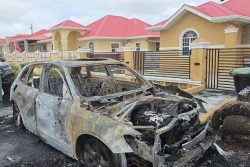Juan Manuel Santos was re-elected president of Colombia on Sunday in the narrowest election race in the country’s history. He won with 51 per cent or 7.8 million votes while his opponent, Oscar Ivan Zuluaga, got 45 per cent or 6.9 million votes. The turnout was, however, low – 48 per cent, a slight improvement on the 40 per cent recorded in the first round on May 25, in which Mr Zuluaga prevailed by 458,156 votes.
Mr Santos’s win is, nevertheless, being hailed as a mandate to continue the negotiations he began in 2012 to end the bloody civil war that has been going on for the past 50 years. But the peace talks with the revolutionary Marxist-Leninist guerrillas, the FARC, have divided public opinion in Colombia and the election was a polarising affair. And notwithstanding gracious speeches by both victor and vanquished, Colombia is still a bitterly divided country.
Mr Zuluaga, of the right-wing Centro Democrático (CD), had campaigned on the promise of imposing tougher conditions on the FARC, urged on by his political patron, former president Alvaro Uribe – whose defence minister, ironically, Mr Santos had been. Mr Uribe had taken the fight to the FARC during his 2002-2010 rule and he is fervently opposed to the peace process because it could hand FARC leaders political power without punishment for their crimes. A vote for Mr Zuluaga was effectively a vote for Mr Uribe; a win for Mr Zuluaga and the CD would have signalled a return to playing hardball with the rebels, if not an escalation of hostilities, and could well have scuppered the push for peace.
The vote for the centre-right Mr Santos was, in effect, a vote for peace. When he lost the first round, he declared the run-off “a choice between war and peace,” staking his political future on winning a mandate to secure peace. He then sought the support of the defeated leftist candidates and their voters, most of whom had certainly not voted for him. The incumbent played his last ace when he revealed, just before the election, that preliminary talks had begun with the country’s second biggest rebel group, the National Liberation Army (ELN).
Having won with the endorsement of key leftist leaders, Mr Santos will now be under intense pressure to complete the negotiations on the five-point agenda for peace (encompassing the drugs trade, victims’ rights and compensation, agrarian reform, FARC participation in politics and how to end the war) during the next four years. He has promised to submit any final accord to a national referendum. But, in spite of the vote for peace, there are huge challenges to be surmounted.
In the first place, the left’s support of Mr Santos could actually strengthen the FARC’s bargaining position, especially with regard to the stickiest issues of reparations for victims and justice for the FARC’s past crimes. The left have also made it clear that they are not giving the president a blank cheque, for beyond the peace agenda they want him to address critical social issues such as education, health, job creation and crime.
Nevertheless, the left want the peace talks to succeed and Mr Santos knows this. Thus, in his victory remarks, whilst recognising the backing of the left as well as their political differences, he stressed the triumph of unity in the desire for peace: “Colombians, including many who did not sympathise with my government, mobilised for a cause, the cause of peace.”
On the other hand, given the narrowness of his victory and with almost half of the country favouring the CD’s more aggressive approach to the FARC, Mr Santos cannot appear to be making too many concessions and he may have to harden his negotiating position somewhat. Thus, he also addressed the guerrillas in his speech: “Today’s message is also for the FARC and the ELN, and it is a clear message: this is the end, and you must come along with seriousness and determination.”
Mr Santos’s task will be anything but easy, especially as the March congressional elections saw the majority enjoyed by his Unidad Nacional coalition reduced, with the CD securing the largest representation in the opposition and in a position, potentially, with the centre-right Partido Conservador to derail any proposed legal changes under a peace deal. The re-elected president and his party will therefore have their work cut out to negotiate deals with both left and right to pursue the reforms the country needs in the interest of continued development, even as he strives to win more Colombians over to the overarching quest for peace.








